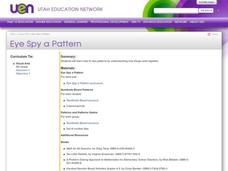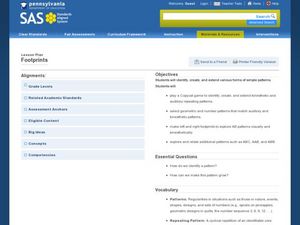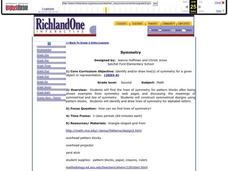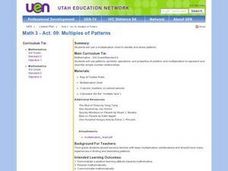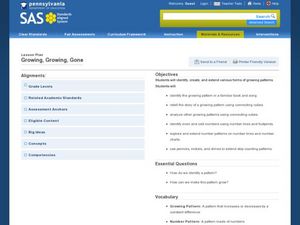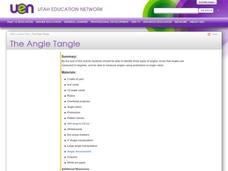Virginia Department of Education
Integers: Addition and Subtraction
Young mathematicians construct their own understanding of integers with an inquiry-based math lesson. Using colored chips to represent positive and negative numbers, children model a series of addition and subtraction problems as...
Curated OER
Fun patterns
Students gain an understanding of shapes and patterns using Interactive Math Journey while reviewing the names of shapes and colors.
Curated OER
Eye Spy a Pattern
Fifth graders examine how to see patterns by showing how things work together. They identify, analyze and determine a rule for predicting and extending numberical patterns involving operations of whole numbers, decimals and fractions.
Curated OER
Making Patterns
Students utilize skittles and unifix cubes to practice the recognition and creation of a variety of patterns. The created patterns are copied onto sheets and the colors are labeled.
Curated OER
Learning about the World of Color, Object and Shape Patterns
First graders practice identifying and creating patterns by using unifix cubes. In this visual design lesson, 1st graders investigate reoccurring patterns using colors and shapes and extend what is being made with their unifix...
Curated OER
Recognizing Patterns
Students explore the concept of patterns. In this patterns lesson, students use applets to manipulate tessellations. Students predict the next number in a sequence by recognizing patterns.
Curated OER
Geo Jammin' By Design - Day 7, Lesson 38: Kool Cups
Create geometric cups by interpreting directions, informational text, and mathematical concepts. Critical thinkers apply geometric theory (congruent shapes, patterns, symmetry) to actual directions to create a cup that holds Kool Aid....
Curated OER
All A-buzz About Math
Second graders participate in Math-Eze activities to comprehend word problems. In this word problem lesson, 2nd graders recognize why a hexagon is the best shape for a beehive. Students calculate how far bees must travel to find 2 lbs....
Curated OER
Data Analysis Using Technology
Analyze data using technology. Middle schoolers design data investigations, describe data, and draw their own conclusions. Then they select the best type of graph, graph and interpret the data, and look for patterns in trends. They also...
Curated OER
Patterns in Nature Booklet
Young scholars examine patterns on objects in nature, then use rubbings of these patterns to create pattern booklets.
Curated OER
Math Activity File
Third graders describe the difference between area and volume and also explain how various units of measure relate to one another.
World Wildlife Fund
Take 6
Investigate the various properties of the number six with this elementary math lesson. From simple addition, subtraction, multiplication, and division problems to the creation of hexagonal tessellations, this lesson covers all aspects of...
Curated OER
Footprints
Students explore patterns. In this patterns geometry lesson plan, students identify and extend patterns including body parts, movement, geometric shapes, noises, and footprints. Students create and share an original pattern.
Curated OER
Symmetry
Second graders find the lines of symmetry in pattern blocks and alphabet letters. In this symmetry lesson, 2nd graders discuss what symmetry is, view examples of lines of symmetry and apply what they have learned by finding the line of...
Curated OER
Geoboard Squares
Students create squares of different sizes on a geoboard. They find and describe a pattern. Students use the pattern to determine the number of squares possible on a 10-by-10 geoboard. They create squares with a horizontal base (and...
Curated OER
Rep Tiles
Third graders use pattern blocks of one shape at a time to try to create a similar shape. They compare the perimeter of the new figure with the perimeter of the original shape and look for a pattern. Students use the pattern to predict...
Curated OER
Measuring Math Vocabulary
Students go over math vocabulary words and show examples of the terms on the board. In this math vocabulary lesson plan, students go over many words and are given a worksheet with words and definitions.
Utah Education Network (UEN)
Multiples of Patterns
Elementary mathematicians identify and share patterns found in multiplication. Through memorization drills and games, they identify the increments in which numbers increase when multiplying. Using a multiplication chart, learners...
Curated OER
Geometry Patterns
Fifth graders, using graphic and word processing software, create geometric patterns by performing elementary transformations.
Curated OER
Growing, Growing, Gone
Budding mathematicians identify growing patterns in numbers and songs then create their own patterns. They look at number patterns and language patterns and then create their own using money and footprints.
Curated OER
Which Fish Where?
Here is a lesson outline that prompts elementary students to graph and analyze data regarding fish caught along the Hudson River. They will review vocabulary and complete 2 worksheets which can be accessed by clicking on the provided links.
Curated OER
Visualizing Multiplication
Upper graders represent multiplication of a two-digit number by a two-digit number as the area of a rectangle with dimensions of the two factors. They find patterns for the number of different base ten blocks in a rectangle representing...
Curated OER
Angles
Fourth and fifth graders investigate angles and name them according to the criteria for obtuse, acute, and right angles. They examine a human-made yarn pattern on the floor of their classroom and identify angles, vertices, and types of...
Curated OER
How using number patterns help us add or subtract
Second graders use a number line to understand multiples. In this number line activity, 2nd graders use a floor size number line and calculate problems with multiples. Students complete a worksheet with multiples.




